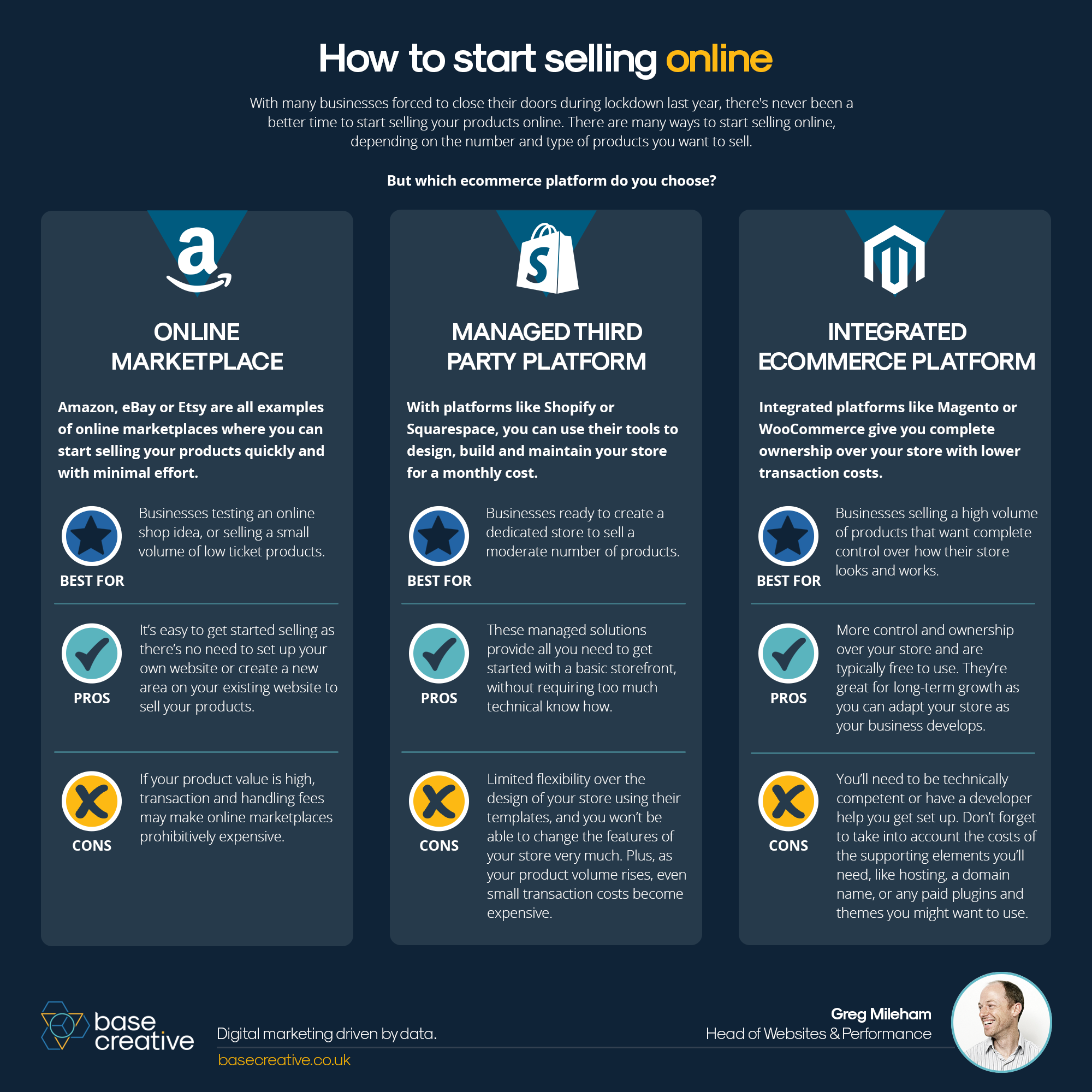Best Open Source and Free Ecommerce Platforms to boots conversion in 2022
The main difference between open source ecommerce software and proprietary software is that you manage everything yourself—or pay a third-party provider to do so. As the saying goes, tremendous power comes with great responsibility
- By
- 1591 views
- 0 reply
TABLE OF CONTENTS
"I Knew My Store Could Do Better...
But I Didn't Know How"
That's what one of our clients, Jessica, told us. She was running a small mug store on WooCommerce—sales were okay, but stuck.
Until she discovered personalization.
Until she discovered Cmsmart.
Fast-forward 30 days:
- ✅ Her store was redesigned with AI product options
- ✅ Customers could design their own mugs with 3D preview
- ✅ AOV jumped by 42% — and she finally felt in control
Want to learn how she did it (and how you can too)?
🎓 Join our FREE 30-Day Email Course:
"Personalize, Launch & Scale – The Smart Ecommerce Way"
You'll get:
- ✔ 1 lesson a day, straight to your inbox
- ✔ Real store examples, demos & playbooks
- ✔ No tech jargon. Just strategy that works.
Join thousands of store owners learning how to scale smarter.
🎉 You're In! Thank You!
We've received your information and you're now part of our smart ecommerce journey.
Please check your inbox – your first email from the 30-Day Course is on its way!
📩 Didn't see it? Check your spam or promotions tab and mark us as safe.
We're excited to help you personalize, launch, and scale your store – the smart way.
TABLE OF CONTENTS
Related Post
Did you know that eCommerce sales are projected to reach a staggering $8 trillion by 2027? In a world where high transaction fees and limited flexibility can cripple potential...
Imagine doubling your conversion rates simply by understanding and implementing the latest trends in eCommerce - sounds exciting, right? In a 2022 report, it was highlighted that the global...
Introduction: The Power of Custom Stickers for SMEs In today’s dynamic ecommerce landscape, custom stickers have emerged as a powerful tool for small and medium-sized enterprises (SMEs) to stand out,...
Other Usefull Contents
You can see many success stories from our customers, and you may be one of them in the future












No one can reject the attraction of the lucrative e-commerce market. Building an ecommerce website is the first step to participating in this industry. Whether you do it yourself or hire a professional development partner, you will have to choose the platform to build your ecommerce website: Open Source or SaaS. You need to consider many factors to make the right decision such as budget, capability, and technical requirements,...
Each type of platform has its own advantages and disadvantages, but in this article we will focus on analyzing open-source ecommerce platforms including concepts, pros, and cons. Finally, the list of best ecommerce open source platforms will be present, they are all free or low cost platforms.
What Is Open Source?
Open source is considered code that is free to use and can be accessed by anyone. This means that you are completely editing and changing the code as you need with no cost. You also have full control over your online store including the façade design and operations.
You can use an open-source with no cost but you will still have to pay for the hosting, domain, extension, the plugin that you want,... However, if you compare opensource and SaaS, the cost of open source is still cheaper.
The main difference between opensource e-commerce software and proprietary software is that you manage everything yourself or pay a third-party provider to do so. As the saying goes, tremendous power comes with great responsibility. So, unless you have in-house developers/programmers, you'll most likely require the help of a development firm to construct and maintain your open-source eCommerce website.
Pros and cons of ecommerce opensource platform
Pros
Flexibility: Open source is a flexible platform, you get free access to it, so you can set up the features you need. From features to storefront design, you are allowed the freedom to create and customize your website without being limited by any framework.
Community support: Open source is built and supervised by developers. Although there is no one in charge of supporting you, you can still get help from experts in the community. By participating in online forums, you can receive advice from experts and learn from their experiences.
Cost-effective: Almost e-commerce open source platforms are free to use. You will not have to pay any fees for download or installation. This is really an advantage that businesses with limited expenses really like. They will be able to save a large amount of money on developing a website.
Easy to integrate: No matter how many features an open-source provides, you still need to integrate with 3rd party applications to serve your online business. CRM, accounting software, shipping, etc are things that you can integrate into your website easily.
Cons
Security: Although open source is seen as an ideal place for developers, it is also a target for hackers. Especially e-commerce information is really valuable. Hackers can invite vulnerabilities to steal information. Although there will also be patches provided by the open source, you will have to install them yourself.
Not user friendly: Many open source software requires users to have programming knowledge to use them, so many people have difficulty installing open source. In addition, there will be no one primarily responsible for your support, you will have to struggle to find support from the community or from another development company.
Complex Maintenance:Open source platforms require regular maintenance to ensure the website is functioning correctly. Maintenance is quite complex, so you will need a highly qualified development team or hire a business to take over this task.
Hidden cost: Although the open source platform is provided for free, you will still have to pay for hosting, domain,.... In addition, many source codes require programming proficiency in customizing and you will have to rent a professional to do this task.
Top open source e-commerce
You've come to the correct spot if you're seeking a cheap or free open-source ecommerce platform. Technically, you may use any ecommerce platform, as the bulk of them are already rather affordable.
When evaluating and selecting one of these ecommerce frameworks, it's critical to consider the sort of development experience you want.
WooCommerce
WooCommerce is an open source ecommerce WordPress plugin, it simply connects with your existing WordPress site, transforming it into a fully working e-commerce website in just a few clicks. In order to understand more about woocommerce please refer WORDPRESS MULTI VENDOR MARKETPLACE THEME or Create a unique platform to sell online or provide services to your customers please view WOOCOMMERCE DEVELOPMENT SERVICES.
When the plugin was first released in 2011, it immediately became the go-to solution for people wishing to set up their own online businesses. Automattic (the proprietors of WordPress.com) purchased the plugin and its parent business in 2015, making it their largest acquisition to that point, and it has proceeded to develop rapidly in the years afterwards.
It presently powers over 99 percent of WordPress e-commerce websites in the United States, Canada, and the United Kingdom (Source: BuiltWith.com.). It's the driving power behind many e-commerce sites, with over 27,000,000 downloads and millions of active installations (Source: WordPress.org.)
WooCommerce comes with basic shop capabilities out of the box, and a free plugin is accessible via the Plugin Repository or directly from your WordPress dashboard. While it has hundreds of extensions available – more on that later! - it delivers some great abilities straight out of the box.
Pros of WooCommerce:
The plugin is completely free to download and install. Many retailers do not require anything other than the plugin.
The plugin is completely free to download and install. Many retailers do not require anything other than the plugin.
It is linked to all major payment gateways.
Aside from adding content, you don't have to do anything with a WooCommerce theme. Bạn có thể mua theme từ WordPress hoặc từ Themeforest.
WooCommerce storefront plugin is an open source ecommerce solution.
With the aid of the extension library, you may give coupons and discounts as well as add a variety of additional services.
Cons of WooCommerce
Features
Data Security
Email Marketing
Inventory Management
Mobile Access
Multi-Currency
Order Management
Returns Management
SEO Management
Shopping Cart
Social Media Integration
CS-Cart Multi-Vendor
For starters, there's the "CS-Cart" platform, which is essentially the best open source shopping cart software with all of the necessary elements for setting up a standard online business. Then there's the CS-Cart Multi-Vendor platform, which is an ecommerce program that's a little different from its CS-Cart sister.
CS-Cart Multi-Vendor, on the other hand, is not intended for online merchants looking to establish eCommerce shops. Rather, it is aimed at the major players (mainly companies) that want to develop markets, it has the full function that small merchants may require to develop their storefronts on your website.
CS-Cart Multi-Vendor offers you a 15-day free trial and 30-day money-back if you're not satisfied. On the plus side, you won't have to pay for the service every month. CS-Cart Multi-Vendor is available now for a one-time fee of $1,450, $3,500 or $7,500. Ultimately, the price you pay is determined by the features you choose.
Pros of CS-Cart Multi-Vendor
Cons of CS-Cart Multi-Vendor
CS-Cart Multi-Vendor is not a completely free and open-source ecommerce platform.
Because it is self-hosted, you will need to invest in a third-party hosting solution as well as a developer to put it up and maintain it.
Their user interface may not be as straightforward as that of eBay or Amazon. As a result, they may require some time to become acquainted with the tools and functionalities.
Features
CS-Cart Multi-Vendor
Abandoned Cart Saver
Discount Management
Inventory Management
Kitting
Loyalty Program
Order Tracking
Refund Management
Returns Management
SEO Management
Wix Ecommerce
Wix is the most well-known cloud-based web store builder that was released under an open-source license. The nicest part about this platform is that even free users may utilize its simple drag-and-drop website builder to create a whole site without coding. In fact, you should be able to create a simple free website in a matter of minutes.
The free plan is especially suitable for novices who want powerful tools for creating and hosting a basic business website. It provides access to a large number of customizable pre-designed themes as well as additional icons, clip art, and photos.
Unfortunately, Wix will flood your free website with advertisements. The only way to prevent this is to upgrade to one of the premium plans, which begins at $4.50 per month. And it comes with a slew of additional features like a form builder, custom favicons, email campaigns, and so on.
However, actual ecommerce website capabilities are not available until you subscribe to the Wix eCommerce plan, which costs $16.50 per month. If you want more advanced online selling capabilities, you can scale up to the VIP plan, which costs $24.50 per month. This one is mostly designed for expanding ecommerce sites.
Pros of Wix Ecommerce
It offers a very easy and intuitive drag-and-drop website builder.
Wix offers a plethora of attractive site designs and layouts.
If you want to add functionality to your premium site, you may use a variety of applications from the large Wix App Market.
When you sell online through your ecommerce website, Wix does not take a percentage of your sales. Payment processors are the only ones who will deduct their fair portion of transaction costs.
Cons of Wix Ecommerce
It is difficult to create a completely functional free open source ecommerce website.
The free plan includes advertisements that may interfere with the general appearance of your site. As a result, the web pages will appear crowded and congested.
Wix does not make its underlying code available.
You cannot switch to a new website theme midway through the editing process after you begin working on one. You must restart from scratch.
Features
Campaign Management
Channel Management
Inventory Management
Multi-Channel Marketing
Multi-Store
Promotions Management
Retail Inventory Management
Returns Management
Reviews Management
SEO Management
Spree Commerce
Spree is a completely free open source e-commerce platform. In addition, if you do not want to deal with the technical and hosting issues yourself, you can also purchase a paid service plan.
Spree is quite flexible so customizing your website is quite easy. You are free to build the features you want, also Spree also gives you the freedom to design the storefront without being constrained by frameworks.
One thing to keep in mind is that the platform needs to be installed and integrated manually. This means that you will need to prepare yourself with programming knowledge and skills. Or else you can also hire a team of experts to do it.
Especially Spree not only allows you to build traditional e-commerce websites but also build websites with a headless ecommerce model. Your website will be optimized for speed as well as customer experience. In addition, marketing tools are also provided so that you can run your own campaigns.
Pros of Square Online
Great security
Flexibility, easy to customize and set up features
Reliable and solid support
Fast and easy integrations with third-party solutions
Cons of Square Online
Require technical knowledge and skill to use
May involve hiring technical support for ruby on rails
Somes extension are limited
Only a handful of themes are available.
Features
Bulk Ordering
Customer Management
Integrated Development Environment
Inventory Control
Multi-Channel Marketing
Multi-Location
Multi-Store
Multi-Vendor
Order Tracking
Promotions Management
Real-Time Notification
Sales Trend Analysis
Social Media Integration
nopCommerce
nopCommerce is a cheap open source Ecommerce Platform. You will only have to pay $250 for removing the “Powered by nopCommerce” link from the footer of the site.
It also has two versions one for developers and the other for those who are not good at programming. Regardless of version, nopCommerce also provides marketplace connectors, thereby transforming your business into a virtual online mall, similar to CS-Cart Multi-Vendor. As a result, all of your suppliers' items are displayed together, with sales profits transferred to the appropriate merchant accounts.
nopCommerce is also considered a flexible open source platform so you can easily install the extension features and develop the parts you want. It also provides marketing and sales tools suitable for B2B and B2C businesses.
Pros of nopCommerce
Free to use ecommerce open-source platform
There are 2 versions for people with programming knowledge and people with no programming knowledge.
It offers most of the features an online store requires.
It can support several ecommerce stores from a single admin interface.
It now has thousands of ready-made connectors.
Cons of nopCommerce
Although there is no fee to download, you will have to pay some additional fees such as development services, third-party add-ons, themes, site hosting, and an SSL certificate.
Support service is not appreciated. You will have to handle everything yourself after downloading.
Features
Data Security
Inventory Management
Multi-Channel Marketing
Multi-Location
Multi-Store
Promotions Management
Purchase Order Management
Retail Inventory Management
SEO Management
Shopping Cart
Social Media Integration
Magento Open Source
Magento is known as an open source that allows developers to build e-commerce websites. Not only the traditional model, but Magento also allows developers to build e-commerce websites based on a headless structure. It is considered the most customizable headless commerce platform, allowing you to build customer experiences dynamically.
Magento contains much more functions than you could ever hope to utilize. Therefore, this opens up a plethora of possibilities for marketing to your clients and developing membership plans, recurring payments, and discounts. View more If you want to Сreate your own Magento multi-vendor e-commerce store like Amazon, eBay using MAGENTO MULTI VENDOR MARKETPLACE SOLUTION or using MAGENTO DEVELOPMENT SERVICE to develop your site.
Pros of Magento
It's free, but there's a premium version if you want to enhance and scale your business.
With Magento, you virtually never need to hunt for an extension because the feature set is extensive and available right out of the box.
For automated marketing, you may send out product notifications to customers. Price notifications and back-in-stock announcements are examples of this.
The platform allows you to create distinct multilingual web pages that load based on the user's location. This is a fantastic feature for large or corporate retailers.
Cons of Magento:
Magento is feature-rich, yet this may make it clumsy and resource-intensive. As a result, you may need to dedicate a significant amount of money and time to optimization, as this may cause your site to slow down.
Although you can learn how to utilize Magento, you would only consider it if you have programming expertise. Larger firms are known to utilize Magento since they have the access and funds to hire a developer who is familiar with development code.
You are on your own in terms of customer care, as you have seen with the other solutions thus far. Magento is really good for Enterprise clients, as you can see above, therefore it can be pretty pricey when you include the fees for themes, hosting, and the domain.
Features
Conclusion
Open source ecommerce software, such as Magento, WooCommerce, and Spree, is an excellent addition to the eCommerce sector. It caters to the demands of small and medium-sized businesses that have the skills and resources to establish a conventional shop on their own. Dedicated software, on the other hand, is worth considering when a firm wants to focus its efforts on generating sales and chooses to pay an external organization to handle support, hosting, and technical concerns.
Depending on your business plan, you can choose a suitable platform for yourself. If you have any trouble, do not hesitate to contact us, you will receive valuable advice from our experts.
View more: 10 Best Ecommerce Platforms Compared & Rated For 2021